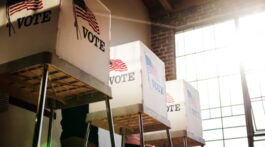If anyone was expecting Governor Mike Braun to ride in on a white horse and single-handedly solve downtown Indianapolis’ crime problem, don’t hold your breath. While he promised a short-term surge of state troopers for this weekend’s WNBA All-Star Game and Indiana Black Expo events, the bigger takeaway from Wednesday’s press conference was this: the city is on its own — unless it gets worse.
In his first major public safety presser as governor, Braun took the gloves off. He gave Indianapolis a not-so-subtle ultimatum: get your act together or the state might step in. He pointed fingers directly at local Democratic leaders — namely Mayor Joe Hogsett and Marion County Prosecutor Ryan Mears — accusing them of failing to support law enforcement and prosecute cases effectively. “The police are doing their jobs,” Braun said. “It’s the rest of the system that’s broken.”
This, of course, comes after a string of downtown disturbances — including a Wednesday morning incident where a man allegedly caused chaos on Monument Circle for the third time in less than two weeks, this time facing felony charges. Add to that the second weekend of the Indiana Black Expo, when tens of thousands are expected downtown, and it’s clear the political heat is rising along with the temperature.
Braun made it clear this isn’t about IMPD. He gave them credit where due. But he wasted no time criticizing the lack of follow-through from city prosecutors. When asked about long-term solutions, Braun deflected, saying that’s a question for the mayor and prosecutor. Translation? Don’t look at me — I’m just the guy sending backup when your leadership fails.
He even floated the idea that maybe it’s time for “new leadership” if the city can’t get its act together. If you’re Joe Hogsett or Ryan Mears, that’s a not-so-thinly veiled political warning.
While the increased state police presence this weekend will be welcomed by downtown businesses and residents, it’s clear Braun sees this as a stopgap — not a state takeover. He left the door open to legislative action, but emphasized that curfew enforcement, juvenile accountability, and prosecution priorities fall squarely on city shoulders.
That’s not to say the state won’t intervene if the political winds shift. If public safety continues to unravel — and if voters keep demanding accountability — don’t be surprised if the General Assembly steps in with bills targeting curfew enforcement or giving the state more authority over criminal prosecutions in high-crime areas.
In the meantime, Braun is banking on public pressure to force city leaders to act. Whether that’s strategic patience or calculated political theater remains to be seen. But one thing’s for sure: he’s drawing a line in the sand.
And if Indianapolis trips over that line again, don’t be surprised if Braun shows up not with backup, but with a legislative hammer.










